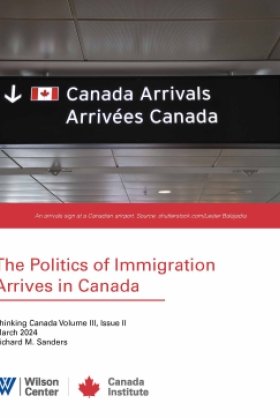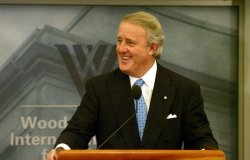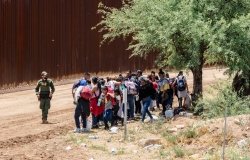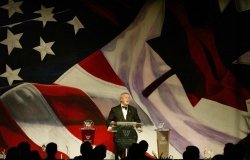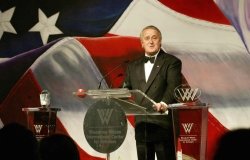NAFTA at 10 <br> Wilson Center Sponsors Conference Celebrating Tenth Anniversary of the Historic Trade Agreement
Ten years ago, President George H.W. Bush, Prime Minister Brian Mulroney, and President Carlos Salinas de Gortari initialed the North American Free Trade Agreement. During this two-day conference, these leaders and other distinguished panelists will discuss the impact of NAFTA on trade, globalization, and further integration of North America.
WASHINGTON, D.C. — The Woodrow Wilson International Center for Scholars along with several co-sponsors, will host a two-day conference December 9-10, 2002, celebrating the 10 year anniversary of the signing of the North American Free Trade Agreement. Over the two days, the conference will focus on the impact of NAFTA and the lessons NAFTA may hold for deepening North American ties, future trade agreements, and the world-wide effort to "get globalization right." The conference will begin in the ballroom of the Ronald Reagan Building and International Trade Center with formal presentations at 9:30 a.m. on December 9 from the three signers of NAFTA, President George Bush, Prime Minister Brian Mulroney, and President Carlos Salinas de Gortari. Following the morning session, panels will convene in the Auditorium of the Woodrow Wilson Center, also located in the Ronald Reagan Building, to assess the agreement itself and its implications for the future.
The 10th anniversary of NAFTA comes in the midst of the most wide-ranging set of trade negotiations the world has ever seen. In addition to the Doha Development Agenda launched last year, there are a number of regional and bilateral negotiations underway. In particular, Canada, Mexico, and the United States will be deeply involved in the effort to forge a Free Trade Agreement of the Americas by 2005. This ambitious trade agenda is taking place in the context of a widespread debate over the benefits and costs of globalization. On the morning of December 10th, separate panels will look at NAFTA as a laboratory for future trade agreements and the effort to "get globalization right."
The very forces that led Canada, the United States, and Mexico to seek closer trade relations with their North American trading partners have also led to deeper economic, social, and cultural ties. To many observers, North America is developing a common labor market and ever closer financial ties. Cooperation among the governments of the three countries goes far beyond the economic arena, and multiple private actors are engaged in cross-border relations. In an era when globalization is often referred to as Americanization, it is all too easy to ignore the impact of Canada and Mexico on the United States. Canadian scholars, artists, and scientists have long made their mark on American culture and learning. Mexican music, art, and cuisine have become as American as the proverbial apple pie. Mexico and Canada are more important in each other's economic, foreign policy, and cultural agendas than ever before. On the afternoon of December 10th, three separate panels will explore the degree to which greater cooperation and integration is taking place in North America and whether this has implications for the sovereignty and identity of the three countries.
During the course of this conference, the panelists will examine the experiences of the last decade to look ahead to the still unfolding development of a North American community both challenged and strengthened by growing economic and social integration. The lessons of NAFTA go beyond North America and will become integral to the success of trade relations in the rest of the Americas, the international trade agenda, and the process of globalization.
The co-sponsors for this event include the Ronald Reagan Building and International Trade Center, the Power Corporation of Canada, the Institute for Research on Public Policy, the Government of Canada, the George Bush School of Government and Public Service, CN---North America's Railroad, the Center for Strategic and International Studies, and the Canadian American Business Council.
This event is by invitation only. Media interested in attending the NAFTA Conference should contact Sharon Coleman, 202/691-4016. For detailed information including the Conference agenda, please visit the Wilson Center website at: www.wilsoncenter.org/nafta10.
The Woodrow Wilson International Center for Scholars is the living, national memorial to President Wilson established by Congress in 1968 and headquartered in Washington, D.C. The Center establishes and maintains a neutral forum for free, open, and informed dialogue. It is a nonpartisan institution, supported by public and private funds and engaged in the study of national and world affairs.
Related Links
Related Programs

Canada Institute
The mission of the Wilson Center's Canada Institute is to raise the level of knowledge of Canada in the United States, particularly within the Washington, DC policy community. Research projects, initiatives, podcasts, and publications cover contemporary Canada, US-Canadian relations, North American political economy, and Canada's global role as it intersects with US national interests. Read more

Latin America Program
The Wilson Center’s prestigious Latin America Program provides non-partisan expertise to a broad community of decision makers in the United States and Latin America on critical policy issues facing the Hemisphere. The Program provides insightful and actionable research for policymakers, private sector leaders, journalists, and public intellectuals in the United States and Latin America. To bridge the gap between scholarship and policy action, it fosters new inquiry, sponsors high-level public and private meetings among multiple stakeholders, and explores policy options to improve outcomes for citizens throughout the Americas. Drawing on the Wilson Center’s strength as the nation’s key non-partisan policy forum, the Program serves as a trusted source of analysis and a vital point of contact between the worlds of scholarship and action. Read more

Mexico Institute
The Mexico Institute seeks to improve understanding, communication, and cooperation between Mexico and the United States by promoting original research, encouraging public discussion, and proposing policy options for enhancing the bilateral relationship. A binational Advisory Board, chaired by Luis Téllez and Earl Anthony Wayne, oversees the work of the Mexico Institute. Read more


